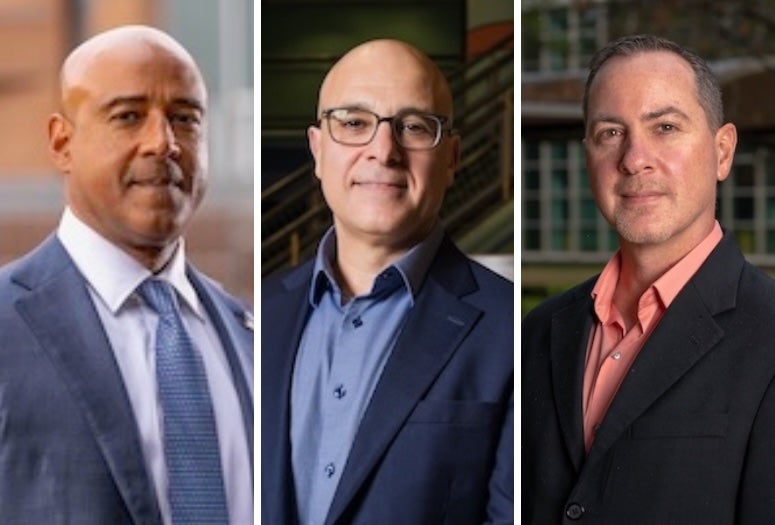Rice University President Reginald DesRoches and faculty members Luay Nakhleh and Angel Martí have been elected fellows of the American Association for the Advancement of Science (AAAS), one of the world's largest scientific societies and publisher of the Science family of journals.

The honor, bestowed upon fewer than 1% of AAAS members annually, acknowledges individuals for their scientifically or socially distinguished efforts on behalf of science and its applications.
DesRoches praised his colleagues recognized alongside him. “It is especially meaningful to share this honor with my esteemed colleagues, Nakhleh and Martí, whose work continues to push the boundaries of discovery,” he said.
Rice Provost Amy Dittmar said her colleagues’ recognition points to the far-reaching impacts of their research. “From engineering safer roads, bridges and buildings to leveraging biology and chemistry to treat diseases such as cancer and Alzheimer’s, these scholars demonstrate how Rice research saves lives and benefits the greater good.”
Advancements in resilient infrastructure
DesRoches, who is also a professor of civil, environmental and mechanical engineering, was honored for his contributions to the field of resilient infrastructure, particularly under extreme loads. His work has been instrumental in advancing earthquake engineering and designing structures that can withstand natural disasters.
“I am deeply honored to receive this recognition from AAAS,” DesRoches said. “Science and engineering have the power to shape the future, and I am proud to contribute to research that makes our infrastructure safer and more resilient.”
Pioneering computational biology

Nakhleh, the William and Stephanie Sick Dean of the George R. Brown School of Engineering and Computing and a professor of computer science and biosciences, was recognized for contributions to the field of computational biology, particularly for models, algorithms and software for phylogenetic network analysis and cancer genomics.
“Computational biology is transforming the way we study life at the molecular level,” Nakhleh said. “This honor is a testament to the hard work of my students, collaborators and the broader research community.”
Excellence in chemistry and education
Martí, professor of chemistry, bioengineering and materials science and nanoengineering, was acknowledged for his contributions to the study of protein aggregates and nanomaterials. His dedication to educating students at all levels and leadership in the field of chemistry have left a lasting impact on both the scientific community and academia.

“This honor from AAAS is both humbling and inspiring,” Martí said. “Scientific progress is built on curiosity, collaboration and the willingness to explore the unknown. I am grateful for the support of my colleagues and students, who challenge and motivate me every day.”
Joining distinguished ranks
The 2024 class of 471 fellows spans 24 AAAS disciplinary sections, encompassing scientists, engineers and innovators from diverse fields. The newly elected fellows from Rice join the ranks of notable individuals such as Mae Jemison, the first Black woman to travel to space; Steven Chu, Nobel laureate and former U.S. secretary of energy; and Vint Cerf, co-designer of the TCP/IP protocols and architecture of the internet.
“This year’s class of fellows are the embodiment of scientific excellence and service to our communities,” said Sudip S. Parikh, AAAS CEO and executive publisher of the Science journals. “At a time when the future of the scientific enterprise in the U.S. and around the world is uncertain, their work demonstrates the value of sustained investment in science and engineering.”
The new fellows will be formally recognized at a forum in Washington, D.C., June 7 and will be featured in the AAAS News and Notes section of the journal Science in March 2025.
The tradition of AAAS fellows began in 1874, with members considered for the rank of fellow if nominated by the steering committee of their respective sections. This lifetime honor not only celebrates individual achievements but also highlights the collective advancement of science and technology.

